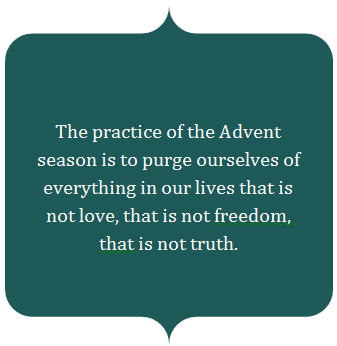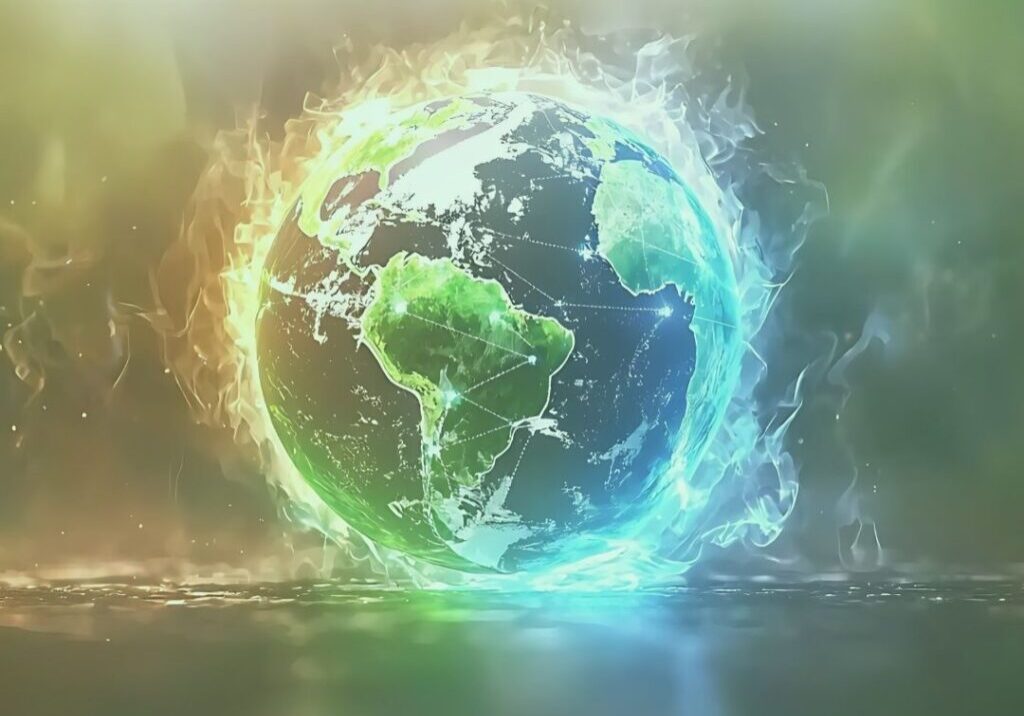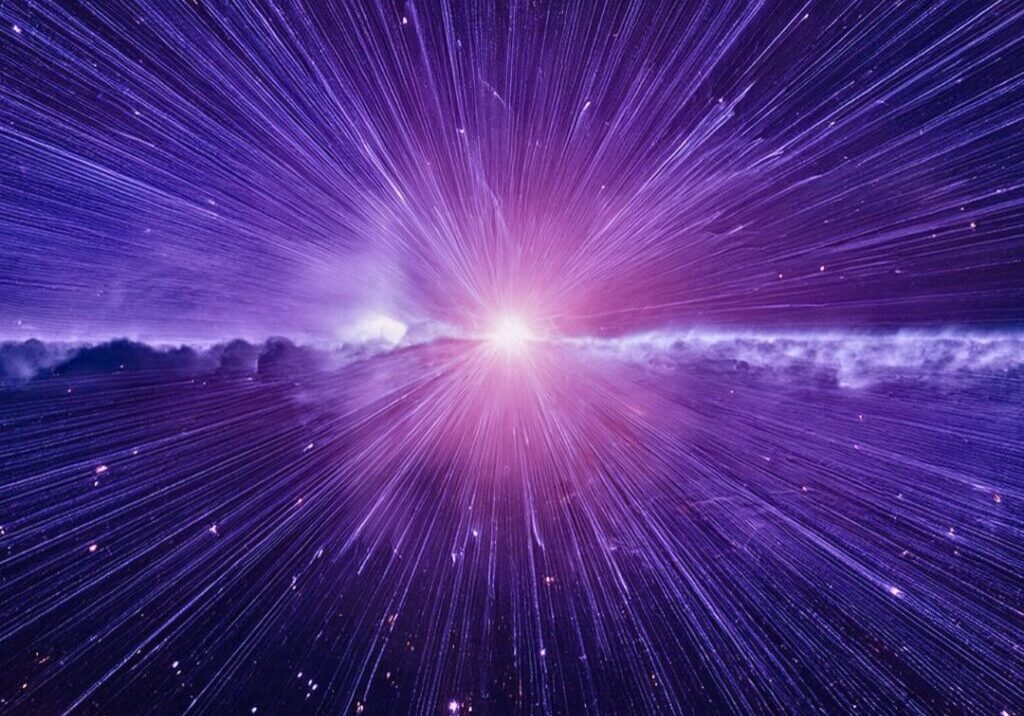Love In An Unfinished Universe: An Advent Reflection
The ancient Jewish mystical worldview is expressed in the Kabala, a system of secret teachings. Here, the Genesis passage affirming that humans are made in God’s image is taken most seriously. The first creation is the Human One, Adam Kadmon and the cosmos is born from and proceeds toward the realization of this Human. This doesn’t necessarily eliminate the scientific observation of a 13.8 billion year old evolutionary process, but it imbues it with meaning and purpose. The hidden meaning of evolutionary process is that it is a growth in and toward the Human One, the image of God. This is a high and holy image of the human being that flies in the face of materialistic notions of the human being as little more than selfish genes using us to replicate (Richard Dawkins), or the result of accidental chemical interactions which over time eventuate in a life form capable of conscious awareness. The irony of the modernist, materialist worldview is that it started out as an attempt to dignify the human being by liberating us from a controlling God. Yet, it has ended up rendering the human as a quintessentially undignified unit of matter enjoying no freedom—which is deemed a necessary illusion.
When Paul writes to the Romans that the whole creation “awaits with eager longing for the arrival of the children of God” (Romans 8:19) it feels to me like he might have had Adam Kadmon in mind. Creation is waiting for us, the human ones, to show up—as the ultimate expression and fulfillment of creation. Many reject this intuition that the universe has us in mind from the start as little more than human arrogance, but I would suggest that in truth it is a healthy corrective for our current low anthropology. The ecocide and terrorism that we are enacting is a manifestation of low esteem, low expectations, and misanthropy. Keep in mind as well that we should not be too quick to assume that the human being who reflects the image of the True Human has yet arrived. Theologian, Gerd Thiessan, notes that paleontologists have been searching for the missing link between the human and the great ape for over one hundred years, without stopping to consider that we may be the missing link! The True Human is an aspirational or eschatological reality.  Humans are made, not born, and this human-making should be the real business of religion. We are called to creatively participate in realizing the high calling of becoming human.
Humans are made, not born, and this human-making should be the real business of religion. We are called to creatively participate in realizing the high calling of becoming human.
The scientific correlate of Adam Kadmon is known as the strong anthropic principle. Cosmologist and mathematical physicists, John D. Barrow and Frank Tipler, posit a universe that was predisposed from the Big Bang forward to eventuate in the conscious and sapient life of the human being. Scientific materialists are suspicious of this idea because it implies both cosmic intelligence and intentionality, which smells of some kind of God meddling with the physical laws of the universe. Tipler was inspired by French paleontologist and Catholic priest, Pierre Teilhard de Chardin, who intuited the Christ’s cosmic nature—that is, that the evolving universe at all levels is both animated and allured by the Christ. In this Teilhard followed Paul’s teaching of a cosmic Christ is “before all things and in whom all things are held together” (Colossians 1:17).
Kabalistic theology celebrates the unfinished nature of the universe. It is the explicit mission of realized humans to engage in tikkun (or repair) of the universe. God actually leaves the universe intentionally incomplete. Our gestures of tikkun don’t merely restore the universe to an original perfection. In the act of repair, we improve upon it, with God’s blessing. We are, in effect, intended to be co-creators of the cosmos. We complete the universe, moment by moment, in our acts of repair and co-creation. These acts of completion are in my theology expressions of love, the very nature of God and the image of God, Adam Kadmon. These acts of completion (or perfecting) represent our way of participating consciously in the evolution of the universe, as expression of human/divine love.
When Paul writes that he is, through his sufferings, “filling up what is lacking in Christ’s afflictions for the sake of his body…”(Colossians 1:24), he is setting his own suffering in the context of completing or perfecting the work of the Christ. Similarly, the Jesus of John’s gospel, invites the disciples to “complete his joy” (John 17:13).
Traditionally understood, the season of Advent is a much more passive affair. The twofold concern is to prepare for the celebration of the birth of Jesus (the “first coming) and to get ready for his second coming. Jesus has already done the redemptive heavy lifting two thousand years ago. All that’s left to do is to keep our noses clean and our eyes open until he returns. Unlike the Kabalistic understanding of the human as completing or perfecting what God started, the human being is exclusively on the receiving end.
This passivity, combined with liberal Protestantism’s post-mythical, highly rational version of faith, renders the season of Advent little more than a countdown to the real event, which, for a liberal Protestant child is Santa Claus, not Jesus. The second coming is simply an embarrassment and so it is rarely mentioned. Catholics may leave the myth intact, but in a way that renders the whole of the Hebrew Scriptures as mere foreshadowing and prefiguring of the coming of Christ. Being married to a Jew, I can assure the reader that this kind of supercessionism is insulting.
If I were to suggest a way forward it would be by taking Jesus’ own self-understanding of his mission more seriously. It seems clear that he regarded himself as the fulfillment of Ezekiel’s “Son of the Man” (The Human One, Ezekiel 1:25-28). The article is left out of most translations but left in it sounds an awful lot like Adam Kadmon – The Man/Human One. It’s a mystery why this title (which is the only one, beside Sophia’s Child) that Jesus applied to himself has not been taken more seriously. He never called himself Christ, and scholarship confirms that he didn’t regard himself as the Messiah. But Human One appears 96 times in the New Testament.
As New Testament scholar, Walter Wink, points out, in Ezekiel’s vision a human is sitting on God’s throne! This leads Wink to write: “Lo I tell you a mystery. God is human and we are to be like God”. In this theological vision of the Human One, to realize our human nature is to realize our divine nature. We don’t become human by transcending our human nature and becoming divine. We realize our divine nature by becoming true humans.
We prepare for the story of the birth of Jesus, the Human One, by waking up to the truth that we, like him, are called to be fully human. To get this is to be startled by the coming of God into our lives. It turns out that what we are called to prepare for is the birth of the True Human in us, in our community, and in the world. This is not secular humanism, for the human, we know intuitively, is participating in a repair/co-creation that is part of a divine plan or intention. We understand that the gospel story is an externalization of our own story told through the life, death, and resurrection of one who was Human – and that we are to become that!  And that this carries with it an immense responsibility, to consciously participate in our own evolution in and toward the incarnation of the Human. And notice, that in the Advent readings Jesus doesn’t talk about the “second coming of Christ”, but rather the coming of the “Human One” (Matthew 24:39). We are anticipating, in other words, our own recreation, rendering us active agents in the repair and recreation of the world.
And that this carries with it an immense responsibility, to consciously participate in our own evolution in and toward the incarnation of the Human. And notice, that in the Advent readings Jesus doesn’t talk about the “second coming of Christ”, but rather the coming of the “Human One” (Matthew 24:39). We are anticipating, in other words, our own recreation, rendering us active agents in the repair and recreation of the world.
The practice of the Advent season is to purge ourselves of everything in our lives that is not love, that is not freedom, that is not truth. Needless to say, this is not an easy path. It certainly is not a passive path. You and I are completing or perfecting the love that was known in Jesus of Nazareth, and in all courageous souls, willing to join the lineage of the heart-broken ones. But over a lifetime we may discover that what is left over after the dying to all that is not essentially human is the Human One. And we too will be lifted up, with Jesus, to the throne of God where love reigns eternally. And the Human One will have once again have disrupted the way of greed and fear. Through you, and the body of Christ, by God’s grace, the cosmogenesis, the birth of the universe occurs, again and again.
 View print-friendly version
View print-friendly version
1 Comments
Related Posts

The Earth Groans, AI Grows: Who Guides the Flame?
In this critical moment of planetary history, where ecosystems collapse, artificial intelligence proliferates, and human meaning trembles on the edge of uncertainty, we are faced with a profound question: What kind…


Noting the author’s (Bruce’s) background as a transpersonal psychotherapist, I am struck by the contention supported elsewhere that much of human wanting is tied to fantasy and illusion in our stories of meaning – more specifically, that the psyche does not tolerate being in falsehood and hence the ego creates problematic behaviors as it tries to convince otherwise. The Kabbalistic story of Adam Kadmon offers a subjective truth that nourishes the psyche in a generative and healing (whole-making) manner. When taken together with the story of the Christ, in evolution and co-creation, Advent arises anew for me with a transpersonal vigor and vitality that outshines the objective light of death’s banality with an overarching “zest for life” – perhaps in the lineage of ” the Human One” as I strive to die to all that is false and not essentially human?